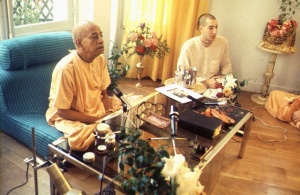CC Madhya 24.88: Difference between revisions
m (1 revision(s)) |
(No difference)
|
Revision as of 16:02, 20 March 2008

A.C. Bhaktivedanta Swami Prabhupada
TEXT 88
yac ca vrajanty animiṣām ṛṣabhānuvṛttyā
dūre-yamā hy upari naḥ spṛhaṇīya-śīlāḥ
bhartur mithaḥ su-yaśasaḥ kathanānurāga-
vaiklavya-bāṣpa-kalayā pulakī-kṛtāṅgāḥ
SYNONYMS
yat—which; ca—also; vrajanti—go; animiṣām—of the demigods; ṛṣabha-anuvṛttyā—by practicing the best means of spiritual life; dūre—keeping at a distance; yamāḥ—the regulative principles; hi—certainly; upari—above; naḥ—our; spṛhaṇīya-śīlāḥ—decorated with desirable qualities; bhartuḥ—of the master; mithaḥ—mutually; su-yaśasaḥ—who has all transcendental qualities; kathana-anurāga—attracted to discussions; vaiklavya—transformation; bāṣpa-kalayā—with tears in the eyes; pulakī-kṛta—jubilation; aṅgāḥ—bodily limbs.
TRANSLATION
“‘Those who discuss the activities of Lord Kṛṣṇa are on the highest platform of devotional life, and they evince the symptoms of tears in the eyes and bodily jubilation. Such persons discharge devotional service to Kṛṣṇa without practicing the rules and regulations of the mystic yoga system. They possess all spiritual qualities, and they are elevated to the Vaikuṇṭha planets, which exist above us.’
PURPORT
This is a quotation from Śrīmad-Bhāgavatam (SB 3.15.25). In this verse Lord Brahmā is speaking to all the demigods, who feared the two asuras in Diti’s womb. Lord Brahmā described the Kumāras’ visit to Vaikuṇṭha, and this was again explained by Maitreya, the friend of Vyāsadeva, when he gave instructions to Vidura.